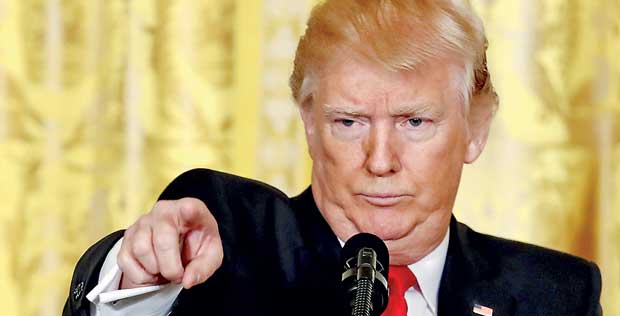22 Feb 2017 - {{hitsCtrl.values.hits}}

By Margaret Sullivan
(c) 2017, The Washington Post ·
For those who care about press rights in America, President Donald Trump’s words last week were stunning and disturbing.
The news media is not merely “scum,” as he has said many times before, but now “the enemy of the American People.”
This tweeted pronouncement, with its authoritarian echoes, came soon after Trump’s vow to stamp out the unauthorized flow of intelligence-community information to journalists. “I’ve actually called the Justice Department to look into the leaks,” he said. “Those are criminal leaks.”
Add up these two elements and you get a troubling question: Will the Trump administration’s crackdown on leaks include journalists as well as their sources?
Some knowledgeable lawyers and academics say it’s unlikely.
“Right now, it’s a deviant practice, certainly not in the ordinary course of business, to subpoena a journalist,” said David Pozen, a Columbia University law professor who wrote the landmark study “The Leaky Leviathan: Why the Government Condemns and Condones Unlawful Disclosures of Information.”
But, Pozen told me: “If we’re in a new paradigm, that could change.”
That such things are changing already was evident in Trump’s statement, quoted above, about making an assignment for Justice Department officials - who, after all, are supposed to operate with a measure of independence, choosing their own cases, not as corporate functionaries reporting to the chief executive.
As for a new paradigm, it - or something else quite weird - was on full display in that news conference in which Trump hardly stopped attacking the assembled news media. That surreal 75 minutes included mind-spinning contradictions about real leaks somehow creating “fake news.”
But wait, you might say. Why should journalists be treated any differently from any other citizens? Why shouldn’t they testify about their sources or even be prosecuted themselves when information obtained illegally is published?
Well, because the democracy is built on their ability to serve as a check on government power. They need to be able to do their watchdog job unfettered, and to tell citizens at least some of what their government is doing in secret. A crucial part of that is the ability to promise confidentiality to sources.
Oddly enough, if the Trump administration goes down the dangerous road of eroding those freedoms, it’s the Obama administration that will have set those wheels in motion. Nine times during the past eight years, the Justice Department used the once-obscure Espionage Act to prosecute leakers - three times the usage of any other administration since the law was enacted 100 years ago.
And reporters were drawn into the fray.
Investigative reporter James Risen of the New York Times faced the very real possibility of jail time for protecting a confidential source during the leak investigation of Jeffrey Sterling, a former CIA officer. More extreme still was the Justice Department’s naming of another Washington journalist, James Rosen of Fox News, as a criminal co-conspirator in a different leak case, thus allowing the government to track his phone calls, emails and trips to the State Department.
And it was partly because of the strong criticism of these efforts - both of which eventually were dropped - that new Justice Department guidelines were agreed upon. Then-attorney general Eric Holder eventually said publicly that he never wanted a journalist go to jail for doing his work. But the blueprint was there.
One of the recent guidelines calls for the attorney general himself to sign off before a reporter is subpoenaed. That sounds like a formidable obstacle, but in his confirmation hearing earlier this month, Jeff Sessions ducked the question of what he would do.
You might think the First Amendment would protect journalists from getting drawn into court. After all, cases that rely on the First Amendment, especially one related to the Pentagon Papers, prohibit the government from “prior restraint” of publication.
But when it comes to the so-called “reporter’s privilege,” case law is notoriously shaky, and Justice Department guidelines enacted in recent years are well-intentioned but toothless.
“The protections are normative, not legal,” said Susan Hennessey, managing editor of the Lawfare blog and a former National Security Agency attorney.
And folks, we don’t live in Normal Town any more.
Separately, congressional efforts to enact a federal “shield law” - like those in many states - have seemed promising, but gone nowhere.
Instead, journalists remain dependent on something far less certain: what former deputy attorney general James M. Cole (referring to the Justice Department guidelines that he helped develop) called a “shadow shield law.”
Trump, meanwhile, has seen the enemy. And it is, well, us.
His media attacks apparently signal strength and resolve to his core supporters. Make no mistake: This is a calculated move on his part - and, politically, a proven winner.
Will he or his advisers take the next logical step against “the opposition party,” as they call journalists, and pull them into damaging court battles? If so, a “shadow shield law” sounds like pretty flimsy protection.
17 Nov 2024 4 minute ago
17 Nov 2024 31 minute ago
17 Nov 2024 2 hours ago
17 Nov 2024 2 hours ago
17 Nov 2024 4 hours ago